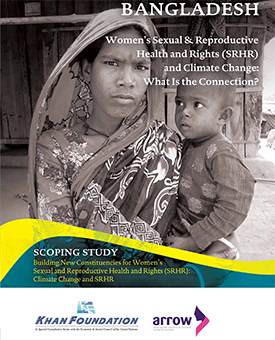The aim of this research is to identify and establish linkages between Sexual and Reproductive Health and Rights (SRHR) and Climate Change in the context of Bangladesh, given the urgent need to understand and establish how gender, along with socio‐ demographic factors of age, wealth and class impact the ways in which climate change is manifested. The scoping study relied on existing literature on gender and climate change issues, survey of rural women from flood‐prone, disaster‐prone and coastal communities, key informant interviews with members of the health, water and sanitation and disaster management standing committees at different tiers of local government, focus group discussions with the local community, key discussions with climate change experts and review of national policies and legislation on women, health and climate change.
Key findings reveal that there is significant inter‐linkage between Climate Change and SRHR. It is observed that the social and political context for women in Bangladesh, such as socio‐ cultural norms and limited access of women to decision‐making increases their exposure and vulnerability to climate change, especially during and post climate change related disasters. Insecure environments in cyclone/flood shelters including overcrowded spaces and lack of privacy exist and there is occurrence of gender‐based violence. During and after disasters, gendered impact of climate change is substantial. Women are especially vulnerable due to lack of access to medical care, services, privacy, security and safety as well as hygiene products such as sanitary napkins and contraceptives.
Key recommendations include incorporation of gender perspectives on climate change impacts and ensuring coherence among and implementation of national policies and programmes. The role of women in decision‐making process should be recognised as vital in the households and also in the community as well as within respective institutions and committees. Political empowerment of women is found to be essential in achieving resilient communities where women and girls can adapt to climate change to ensure secure livelihoods.


